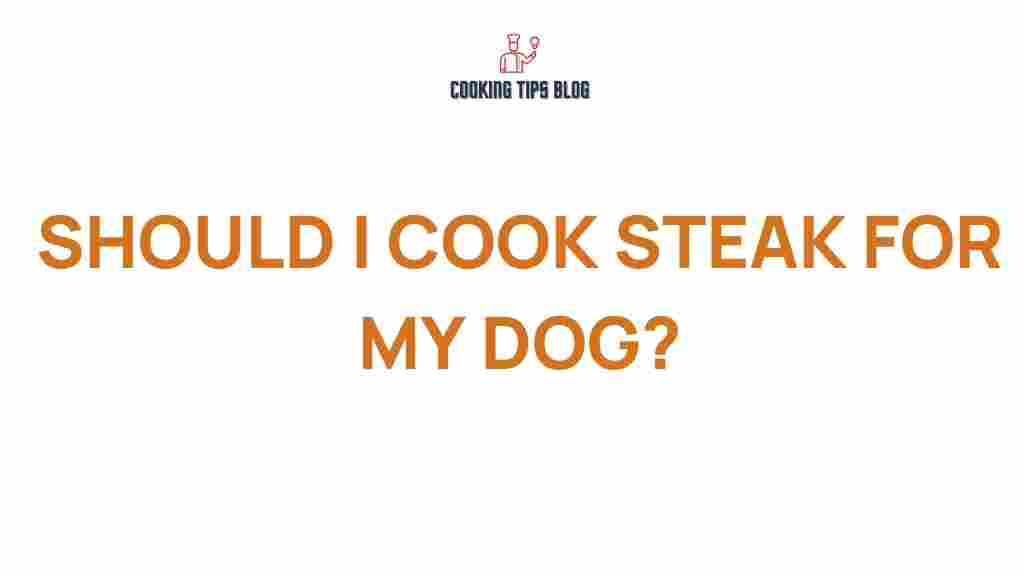Should You Cook Steak for Your Dog? Understanding Dog Nutrition
When it comes to our furry friends, many dog owners often ponder the question: “Should I cook steak for my dog?” While it may seem like a delightful treat, it’s essential to understand the implications of incorporating steak into your dog’s diet, especially concerning dog nutrition. In this article, we’ll explore the nutritional needs of dogs, the benefits and potential risks of feeding them steak, and how to do it responsibly.
Understanding Dog Nutrition
Before we dive into the specifics of steak, it’s crucial to understand what constitutes a balanced diet for dogs. Dogs are primarily carnivorous but also require a balanced combination of nutrients, including:
- Proteins: Essential for muscle development and overall health.
- Fats: Provide energy and support cell structure.
- Carbohydrates: A source of energy and fiber.
- Vitamins and Minerals: Crucial for various bodily functions.
Steak, being a rich source of protein and fat, can be a beneficial addition to your dog’s diet when prepared correctly. However, moderation is key. Let’s take a closer look at the potential benefits and risks of cooking steak for your dog.
The Benefits of Steak for Dogs
When cooked properly, steak can provide several benefits for your dog:
- High in Protein: Steak is an excellent source of high-quality protein, which is essential for your dog’s growth, maintenance, and overall health.
- Rich in Nutrients: Steak contains vital nutrients such as iron, zinc, and B vitamins, which contribute to your dog’s immune system and energy levels.
- Improves Palatability: Most dogs find steak incredibly tasty, making it an excellent way to entice picky eaters.
Potential Risks of Feeding Steak to Dogs
Despite its benefits, there are some risks associated with feeding steak to dogs:
- Fat Content: Some cuts of steak can be high in fat, which may lead to obesity or pancreatitis if consumed in excess.
- Seasonings and Additives: Many recipes include ingredients like garlic and onion, which are toxic to dogs.
- Bone Hazards: Bones from steak can splinter and cause choking or intestinal blockages.
How to Safely Prepare Steak for Your Dog
If you decide to cook steak for your dog, it’s vital to prepare it correctly. Follow these steps to ensure it’s safe and nutritious:
- Choose the Right Cut: Opt for lean cuts like sirloin or tenderloin to minimize fat content.
- Cook Thoroughly: Cook the steak without any seasoning or additives. Aim for medium-rare to well-done to kill any harmful bacteria.
- Remove All Bones: Ensure there are no bones left in the steak before serving it to your dog.
- Portion Control: Cut the steak into small, manageable pieces to prevent choking and monitor portion sizes based on your dog’s size and dietary needs.
Alternative Protein Sources
While steak can be a tasty treat, there are numerous other sources of protein that are also excellent for dog nutrition. Consider these alternatives:
- Chicken: Lean and easy to digest.
- Turkey: Low in fat and high in protein.
- Fish: Rich in omega-3 fatty acids, good for skin and coat health.
- Eggs: A complete protein source, packed with nutrients.
Troubleshooting: What to Do If Your Dog Reacts Badly
Even if you take precautions, it’s possible for your dog to have an adverse reaction to steak. Here’s how to troubleshoot:
- Monitor Your Dog: After introducing steak, watch for signs of digestive upset, such as vomiting, diarrhea, or lethargy.
- Consult Your Vet: If your dog exhibits any concerning symptoms, contact your veterinarian for advice.
- Reevaluate Portions: Ensure you’re not overfeeding; too much protein can lead to health issues.
- Consider Allergies: If your dog has a history of food allergies, consult your vet before introducing new foods.
Conclusion: Is Steak Right for Your Dog?
In summary, cooking steak for your dog can be a nutritious treat when done properly. It offers high-quality protein and essential nutrients that can enhance your dog’s diet. However, it’s vital to consider your dog’s individual health needs and the potential risks associated with feeding them steak. Always prioritize a balanced diet and consult your veterinarian if you’re uncertain about any changes to your dog’s nutrition.
For more information on dog nutrition and dietary tips, explore reputable resources dedicated to pet health. Remember, a well-fed dog is a happy dog!
So, the next time you’re enjoying a delicious steak, consider sharing a small portion with your furry friend—but make sure it’s safe and healthy for them!
This article is in the category Diets and created by Cookingtipsblog Team
